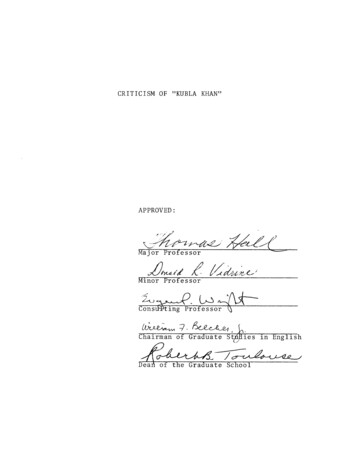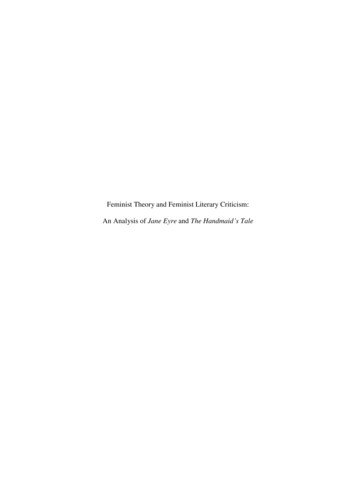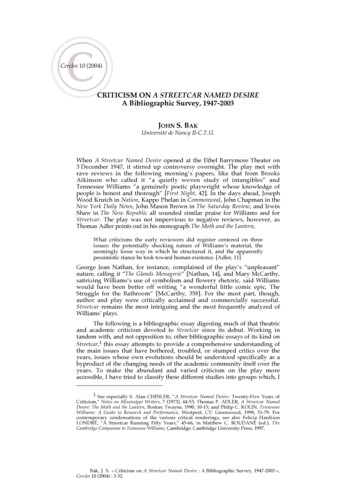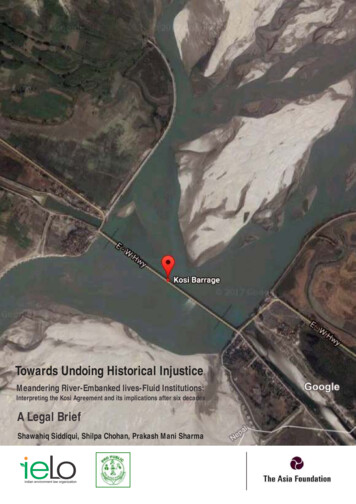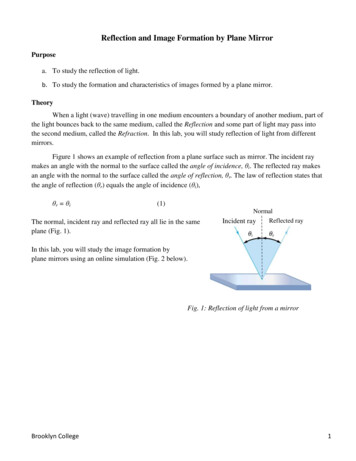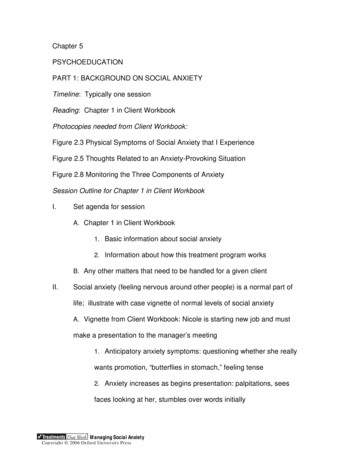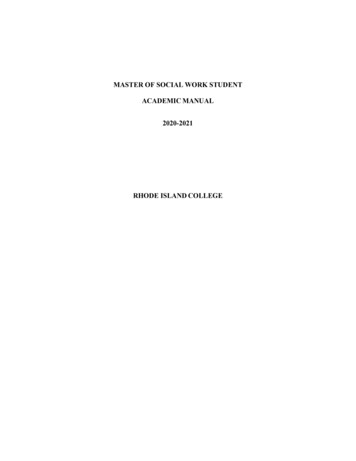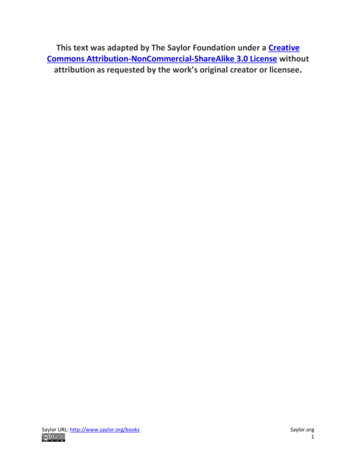
Transcription
CRITICISM OF SOCIAL INJUSTICE REFLECTED IN VICTOR HUGO’S LESMISERABLES (1862): A SOCIOLOGICAL APPROACHMUHAMMADIYAH UNIVERSITY OF SURAKARTAPUBLICATION ARTICLESubmitted as a Partial Fulfillment of the Requirements for Getting Bachelor Degree ofEducation in English DepartmentBy:FEBRYA ISYANA ROSA320110152ENGLISH DEPARTMENTSCHOOL OF TEACHER TRAINING AND EDUCATIONMUHAMMADIYAH UNIVERSITY OF SURAKARTA2017i
i
ii
iii
CRITICISM OF SOCIAL INJUSTICE REFLECTED IN VICTOR HUGO’S LESMISERABLES (1862): A SOCIOLOGICAL APPROACHMUHAMMADIYAH UNIVERSITY OF SURAKARTAABSTRAKStudi ini adalah tentang “Criticism of Social Injustice Reflected in Victor Hugo’s LesMiserables” (1862) yang menggunakan pendekatan Sosiologis. Tujuan studi ini adalahuntuk mengidentifikasi karakteristik-karakteristik ketidakadilan, untuk mendeskripsikansebab-sebab mengapa terjadi ketidakadilan sosial dan mendeskripsikan dampak-dampakdari ketidakadilan sosial yang digambarkan dalam novel Les Miserable berdasarkanpendekatan Sociological. Penelitian ini termasuk dalam penelitian kualitatif. Data primerdari penelitian ini adalah novel karya Viktor Hugo yang diterbitkan pada tahun 1862,sementara data sekunder dari penelitian ini adalah sumber lain yang terkait dalam studiini, seperti: referensi-referensi online, dan beberapa buku yang mendukung penelitian ini.Peneliti menarik tiga kesimpulan dalam penelitian ini. Pertama, ketidakadilan sosialdikarakterisasikan oleh sifat-sifat seperti elitiesme yang efisien, pengeluaran itu perlu,prasangka adalah alamiah, ketamakan dianggap baik, keputusasaan yang tidakterelakkan. Kedua, sebab-sebab ketidakadilan digambarkan terutama melalui plot yangmengkonklusikan bahwa hal tersebut terjadi karena kemiskinan, ketidakadilan dalamcriminal, keluarga yang berubah, sekolah dan pendidikan, pekerjaan dan ekonomi,kesehatan dan layanan kesehatan. Semua itu membuat ketidakadilan terjadi terhadapmasyarakat. Ketiga, beberapa dampak ketidakadilan dapat disimpulkan yakni:kemiskinan yang meningkat, kepadatan yang berlebihan, kelaparan, kerugian mata uang,cuaca yang ekstrem, penyakit kronis dan akut, perang dan penyalahgunaan hak manusia.Kata Kunci: Ketidakadilan Sosial, Les Miserable, Sociology of literature.ABSTRACTThis study is about criticism of social injustice reflected in Victor Hugo’s Les Miserables(1862) using sociological approach. The objectives of the study are to identify thecharacteristics of Social Injustice using Sociological Approach, to describe the causes ofSocial Injustice which is illustrated in Victor Hugo’s Les Miserables, o describe theimpact of Social Injustice towards the main character in the novel Les Miserables. Thisresearch uses qualitative research. The primary data of this research is Les Miserables byViktor Hugo, while the secondary data of this research is other sources related to thestudy, such as: virtual sources and other printed materials that support this research. Theresearcher draws three conclusions in this research. First, social injustice is characterizedby such qualities as Elitism is Efficient, Exclusion is Necessary, Prejudice is Natural,Greed is Good, and Despair is Inevitable. Second, the causes of social injustice aredepicted mainly through the plot concluding that it happens because of Poverty, Crimeand Criminal Injustice, the Changing Family, School and Education, Work andEconomy, and Health and Healthy Care. Those make social injustice happen toward thesociety. Third, the effects of social injustice can be concluded namely: IncreasedPoverty, Overcrowding, Famine, Species Loss, Weather Extreme, Acute and ChronicMedical Illness, and War and Human Right Abuses.Keywords: Social Injustice, Les Miserable, Sociology of literature.1
1.IntroductionSocial injustice is a fair and relation between the individual and society. This ismeasured by the explicit and tacit terms for the distribution of wealth, opportunities forpersonal activity and social privileges. In western swell as in older Asian cultures, theconcept of social injustice has often referred to the process of ensuring that individualsfulfill their societal roles and receive what was their due from society. In the currentglobal grassroots movements for social injustice, the emphasis has been on the breakingof unspoken barriers for social mobility, the creation of safety nets and economic justice.Viktor Hugo, as reflected in his Les Miserable, represents the characteristics, thecauses and the effects of social injustice. The characteristics consist of Elitism isEfficient, Exclusion is Necessary, Prejudice is Natural, Greed is Good, and Despair isInevitable. The Social Injustice has some causes such as: Poverty, Crime and CriminalInjustice, the Changing Family, School and Education, Work and Economy, and Healthand Healthy Care. Those unsatisfactory conditions were gradually bringing a faction ofworkers and college students to the point of rebel make social injustice happen towardthe society. The effects that are happened in society because of the causes are namely:Increased Poverty, Overcrowding, Famine, Species Loss, Weather Extreme, Acute andChronic Medical Illness, and War and Human Right Abuses.The Les Miserable is relatively an old work and many studies have been conducted.Among them were conducted by Erni Sri Astuti (Department English Education, Schoolof Teaching and Training Education, Muhammadiyah University of Surakarta: 2014) inher research paper entitled “ Protest Against Social Injustice in Victor Hugo’s LesMiserables “ the research is about the Marxist criticism condition of the social injusticeof France Government. The second research is also Monica Tan (2012) did review fromthat. Her research title is “Penggambaran Kelas Sosial Melalui Kostum Dalam Film:Analisis Semiotik Dalam 8 Karakter Utama Dalam Film Les Miserables (2012). Shefocuses on the classifying the class social’s characters in Les Miserables. Susi Wuryanti(2005) conducted the third research. Her research title is “Defense Mechanism of JeanValjean in Bille August’s “Les Miserables” movie: a Psychoanalytic Approach”. Shefocuses on the way of Jean Valjean trust to solve the problem in his life. In this article, Ifocus on social injustice.2
2.Research MethodThis study belongs to descriptive qualitative study. The type of the data in thisresearch is in theform of textual data. It consists of narrations, monologues anddialogues. The data collection is done through documentary or library research that is thewriter seeks the data from printed media, the novel in this case, as the primary data andthe other sources as secondary data. The following steps are the procedure to conduct thestudy: first, reading the novel repeatedly, second: taking, important notes in both theprimary and secondary data, which is relevant to the study. The technique of data analysisas stated by Miles and Huberman (in Denzin and Lincoln, 1994: 428-429) includes threesub-processes: data reduction, data display and the drawing of conclusion/verification.3.Data Findings and Discussion3.1 Characteristics of Social Injustice3.1.1Despair is InevitableThe dominant characteristic of social injustice in this study is despair, since this studyfound five data based on the analysis towards the data. Despair in this novel belongs tothe concept that can be displayed in several description of the narrator by giving thedirect opinion such as “He was filled with regret and remorse and he reflected indespair” ( LM, p.1076 ) it implies the feeling of the boy who lost a father. In the idea ofdesperation he thought that if he was still in the shadow of God may it did not happen tohim. But all were in vain because his father was gone. This study exhibits the analyzeddata by providing its example as follows.He was filled with regret and remorse, and he reflected in despair that all he hadin his soul could now be said only to the tomb. Oh! If his father had still been inexistence, if he had still had him, if God, in his compassion and his goodness, hadpermitted his father to be still among the living, how he would have run, how hewould have precipitated himself (LM, p.1076)Second, despair can be concluded in the statement given by the narrator in the end ofsentence “converted into despair.” ( LM, p. 1539 ) the narrator concludes the utterance“was the equal of intelligence” as the intelligence of people is similiarly. It changes intoa despair due to the condition.The third despairs can be viewed in how narrator tells the description of the characterof despairs who believe that their despairs can bring a victory for them who want to be ajustice, as shown in the sentence, “the last weapon, which sometimes gives victory” (LM, p. 2011 ). For them living in an injustice government, their despairs can bring a3
victory. Their despairs make a new strength for a better life. Sometimes, despairs canbuild a new revolution in the better future life.The fourth despair can be seen from the narrator’s utterance “profound despair in theevery agony” ( LM, p. 1899 ). The narrator described that the character of despairs withdisplayed in the novel in which the despairs can be profound and create make a traumaticin people’s life. Many problems in their life make a trauma due to despairs. Mariusthought if many soul with complicated problem in life, violence, prejudice and injusticemake a despair which can be a traumatic mental. However despairs can build a newstrength, positive or negative one.3.1.2Greed is GoodThe other characteristic in the novel that is mentioned is Greed is good. It has fourdata found in the novel. The narrator describes the character of French state society isthrough the description of the character of priests on the novel, by saying “the goodpriest” it means that the priest looks as good one the continue saying “These priests areall thus, greedy and avaricious.” It can be concluded that actually the priest is a greedyhuman but acting looks a good human being. The concept of greed characteristic of theLes Miserables novel can be found in be some conversations and excerpts of the first apriest who had just come asking for a luxurious facility. They ask for a vehicle to passthrough areas that are still not able to be passed. But they still ask to be delivered.Whereas, there are several roads are still covered by a mountain. What they are asking isnot yet as prominent not what they do for the community. So they seemed to be faithfulonly for a comfort and luxury.“No one travels otherwise than on horseback. Even the bridge between Duranceand Chateau-Arnoux can barely support ox-teams. These priests are all thus,greedy and avaricious. This man played the good priest when he first came.”(LM, p.16)The second data of greed is good mention the greedy in the description of characterand in direct conversation mentioned by narrator. The narrator explained the character ofEmbrun’s people, by saying “were greedy for profit and harvest “ (LM, p. 20 ) thesentence explained that the people who live in under economy can be greedy with theirharvest and profit. Both live with greed. Someone said to see people living in theEmbrun area. They know that life is very difficult at that time, those who still live wellask straw and seeds to fill their needs. But they ask the people who are poorer than theyare. They are not grateful for their lives.4
The third data are found in the conversation between a mother and her two childrengiven by the narrator. The characters can be described, by this sentence “It was there thatthat profound remark was made anent a rather greedy paroquet which belonged to alady boarder” ( LM, p. 832 – 833 ) sometimes for another people who live with a richman do not have any care for people who live with a shortage. Six-year-old son told methat he knows about the French but seldom as nine-year-old son said he did not know themother. The mother asked the smallest, why he opened a book. She said she opened abook and asked to find out what will happen next, because he knows a woman who isvery greedy. And her sister said she only wanted to like the rich man who can eat breadand butter.The fourth data of Greedy is good are showed by the narrator through theconversation of the character in the novel, it implies about greedy. The narratordescribed the character with “I am not a greedy fellow” ( LM, p. 1366 ) the people havea greedy act sometimes pretend what they to do. Thenardier asked M.Leblanc sum oftwo hundred thousand francs. He did not mention for what purpose he asked for themoney. He only asked once he thought that the master of the rich. He said she was notgreedy, but he is asking too much. Because on behalf of poor and rich, he does not thinkabout how much money he requested. He is really greedy.3.1.3Prejudice is NaturalPrejudice is Natural which elicits two data in the novel. The first data can be seenfrom the description of the narrator’s utterance“ prejudice are the real robbers”prejudice is the real robbers in human being’s life. An uncontrolled prejudice can be anegative action in every single person’s life. This study found some relationshipsbetween prejudice and several events in the novel as Bishop said that the robber ormurderer is not really scary. However the most frightening is mental prejudice. It cancarry out a bad attitude blends with prejudice. The bishop says that people should startthink about how we treat their souls to avoid prejudice. From the above excerpt, it canbe assumed that a prejudice can be a natural thing. As shown bellow:“Prejudice are the real robbers; vices are the real murderers. The great dangerslie within ourselves. What matters it what threatens our head or our purse! Let usthink only of that which threatens our soul.” (LM, p. 50)From the above sentence can be said that a prejudice could be a natural thing. Thingswe often do and a prejudice has a negative effect on our souls.5
The second data displayed by the narrator tells about the description of the character’sbelief prejudice is natural minded of people and should against the prejudice in our lifethe narrator described by saying “ by the citadels erected against the human mind inevery direction, by superstition, despotism, and prejudice” ( LM, p. 1107 ) Enjolras stillhopes that all of his dreams will come true. One by one has been becoming a demand interms of to materialize although he also acknowledged that he concern for the feelings ofsuperstition, despotism, and prejudice. Since it is a natural thing that is experienced by aperson when he is in a situation like that.3.1.4Elitism is EfficientElitism is Effiecient’s data is the fewest data depicted by the narrator because it justhas one data from the novel. The concept of elitism in the novel Les Miserablescontained in the author citation showing that when the offspring have been born in theworld, then they get the appropriate fate in which he was born. If he is a nobleman hewill get a noble destiny, if he is a prince he would be a king who has the right greatauthority. And this is in the adorable offspring by her family. They want that power justspinning in their family. They are in control of what occurs on the poor classes, it can beassumed that elitism is a problem of society, as shown below:“while appreciating the blood from which he had sprung, counting most of all onhis intrinsic worth, and, on the question of his race, very particular, declaringhimself Orleans and not Bourbon; thoroughly the first Prince of the Blood Royalwhile he was still only a Serene Highness, but a frank bourgeois from the day hebecame king; diffuse in public, concise in private; reputed, but not proved to be amiser; at bottom, one of those economists who are readily prodigal at their ownfancy or duty; lettered, but not very sensitive to letters; a gentleman, but not achevalier; simple, calm, and strong; adored by his family and his household;”(LM, p. 1409)Elitism can make someone feel that the authority of power and richness only onsomeone who has the right since they are born. For poor people, they don’t havechance to have it.3.1.5Exclusion is NecessaryExclusion is necessary’s data is like the data before; it is the fewest data ofcharacteristics of social injustice given by the author in the novel. Exclusion concept inthe Les Miserables seen in page 707, states that one should associate with thebourgeoisie in their environment so that they can enter into the clan. The poor peoplethought that go into these people better. Then the bourgeoisie put aside associate with6
poor people who are around them. Because of an opportunity will not come umpteenthtime for them.“Oh! Monsieur, times are so hard! and then, we have so few bourgeois in theneighborhood! All the people are poor, you see. If we had not, now and then,some rich and generous travellers like Monsieur, we should not get along at all.”(LM, p. 707)People will think that exclusion is necessary to be done when they think thathangout with bourgeoisie is better than poor people.3.2 The Causes of Social Injustice3.2.1 Health and Health CareHealth and Health Care are the most frequent cases appeared in the novel. It has sixdata depicted by Hugo in the novel. This concept found in some cases in the noveldepicted in the direct conversation of the character given by the author. Firstly, for thesake of health and clean place he used shoes. In other words, he was more pleased if notwearing shoes and went barefoot because he was just keeping a cleanliness to avoidcontamination.“‘A clever girl, possibly; but I tell you I won’t put these shoes on again, and that Iwon’t, for the sake of my health, in the first place, and for the sake of cleanliness,in the next. I don’t know anything more irritating than shoes that squelch, and goghi, ghi, ghi, the whole time. I prefer to go barefoot.’” (LM, p.1277)Because of caring with the things which they have, people will choose to keeptheir ownership than their health care.Second data of Health and Health care depicted in the novel is through thedescription of the action of the character implied. He walked with unhealthy. He wasill. He walked with a stagger. And he felt it would be good - fine for putting a crossnext to his bed. He believed in the power of God.The third data is delineated by the author through the direct conversation betweenJean and the Doctor. Jean ill, but doctors say that he is like someone who lost, but he isnow well - fine. And the doctor will be back to check on the state of Jean again.The fourth data of health and health care, it delineates the description of Fantine’scondition. Started in words “she did not recover her health” ( LM, p. 317 ) it impliesclearly that Fantine is not going to better for her condition. Then the narrator continues“her condition seemed to become more grave from week to week” it means that thecondition of Fantine is going to be worse. The day of Jean declines health. She is gettingsick. They think maybe it is time for Jean back.7
In the next data of Health and Health Care is showed by narrator through thecondition of Fantine after selling her teeth and her hairs. She got a trouble in her body.She got a fever, pale and no power in her body.This is the last data of Health and Health Care depicted by the narrator. It is showedthrough the letter sent by the character named Thenardier. Thenardier try to deceiveFantine that Cosette had a high fever that does not go away. So Fantine should sendsome francs for financing purposes Cosette. By the reason of costly medical expensesthen they go on and constantly squeeze to Fantine.3.2.2 PovertyOne of the causes in Social Injustice is poverty; this consists of four data found in thenovel. The concept can be found in some cases in the novel Les Miserables through thedescription of despair feeling and helter skelter depicted by the narrator. After therevolution there was an incident which resulted in some damage and get people notbecause of poverty anymore. But they are angry and feel the same emptiness.One there beheld in a pell-mell full of despair, the rafters of roofs, bits of garretwindows with their figured paper, window sashes with their glass planted there inthe ruins awaiting the cannon, wrecks of chimneys, cupboards, tables, benches,howling topsyturveydom, and those thousand poverty-stricken things, the veryrefuse of the mendicant, which contain at the same time fury and nothingness.(LM, p. 1974 – 1975)The angriness of people comes from the result of revolution that give ssome damagesuch as the poverty. They are lost of materials that they have.The second data of poverty is drawn by narrator through “every sort of sarcasm andall manner of objections at one and the same time, Fauchelevent, Coupelevent, fortune,poverty,” ( LM, p. 2247 ) he existence of a question from a family that is theirconfrontation, fortune and poverty create a resistance in the future with a force becauseof the occurrence of a rejection of the injustice.The third data of poverty is delineated by the narrator in “a limit to wealth” withconclude “by enlarging the notion of the universal aim, in setting a limit to poverty” (LM, p. 1682 – 1683 ) the idea that the narrator concerned with an obligation of politicalthough there will be many things like selfishness we retain our political sense. Only togive a feeling of being loved, increase knowledge possible extent, improve education,and enlarge the common goal.The last poverty depicted by the narrator can be seen in “Marius had lives for fiveyears in poverty” ( LM, p. 1264 ) is delineated by the character. Marius has been living8
in poverty for five years. Poverty that he faced as a man is different from what is seen bya woman. The fact, poverty must be seen with his own eyes so that he can tell what willbe faced with the poverty.3.2.3 School and EducationThe concept of the causes of Social Injustice is education; it has same data withPoverty, four data found in the novel. Education concept can be found in some cases, thefirst is the cabinet of Europe began to be questioned about several things likeprostitution, education, consumption, and some rights for all people can not afford.Meanwhile, within her, pauperism, the proletariat, salary, education, penalservitude, prostitution, the fate of the woman, wealth, misery, production,consumption, division, exchange, coin, credit, the rights of capital, the rights oflabor,— all these questions were multiplied above society, a terrible slope.( LM,p.1423 )Education is the one of questions that must be solved in every country. Becauseeducation in every each country has their each problem and education is the basis of life.Second data of School and Education can be found through “He is an ignorant man,of no education” given by the narrator. It is about a man who has no education, how hewill encounter life in society. Whereas when someone does not automaticallyeducational touching he will not be able to read.The third is displayed by the narrator through” I have no education” ( LM, p. 463 )can describe if we don’t have any education we will difficult for survive in our life, thenarrator conclude “I am a poor man; that is where they wrong me, because they do notsee this”. M.Baloup when asked about Jean Valjean by Javert, he said that he did not toknow jean, which he knew was Jean Mathieu. He said again that he did not study but hedid not steal so he did not know Jean. Because he is poor other people will think he is athief. Like a Jean Valjean.The fourth, the narrator shows the causes of Social Injustice such School andEducation in the novel is through “The education which she had received had alwaystalked to her of the soul” ( LM, p. 1581 – 1582 ) education also teaches virtue,compassion, and how to express love properly. And on these things will make us learneternity, the beginning and termination.3.2.4 Work and EconomyThis data has three data too taken from the novel. It can be seen through “she mustneeds work”. The causes can be found in several conversations, the first was the case ofMadame Thenardier saying that Cosette did not have anything else so he had to work for9
himself. The child's age when he should be playing and learning. Mrs. Thenardier said itwas because he employs Cosette to her advantage.‘You see, sir,’ she pursued, assuming a sweetish air that was even more repulsiveto behold than her fierce mien, ‘I am willing that the child should play; I do notoppose it, but it is good for once, because you are generous. You see, she hasnothing; she must needs work.’(LM, p. 689)The condition of economy sometimes forces someone to work, even they are stillchild. It happens because there are no attentions from the government.Second data is delineated by the narrator through “weeks without work” ( LM, p.1154 ) with conclude the sentence “which one finds locked on one at night becauseone’s rent is not paid”. Some problems like lack of material feeding, cold night withoutlighting of candlelight, and the rooms are locked because they can not pay the rent, sucha future without hope if his life like that.The last data is showed through “How much will you give me for it?” ( LM, p. 361 )that is given by the narrator in the novel. Fantine sell her hairs for ten francs. She did notanything for earned money except she sells her hairs. Economic circumstances urgedhim to sell hair. In order to meet the needs of Cosette. When the economic pressure feltby anyone, anything will do. As Fantine, she was willing to sell her beautiful hair. Anage of ancient treasures including the hair.3.2.5 The Changing FamilyThe Changing Family has two data in the novel. It can be seen in “they recognizedeach other as necessary to each other” It has the lowest in this novel, two data only. Therelationship of changing family in the Les Miserables contained in context when JeanValjean or M. Madeleine meet to Thernardiers. He wants to take Cosette with him. Inother hand, when Cosette and Jean meet, the feeling about them like they can recognizeeach other. In Cosette’s thought Jean is her Father, and in the Jean’s though Cosette likeher daughter. They have a chemistry to be a family.“Nature, a difference of fifty years, had set a profound gulf between Jean Valjeanand Cosette; destiny filled in this gulf. Destiny suddenly united and wedded withits irresistible power these two uprooted existences, differing in age, alike insorrow. One, in fact, completed the other. Cosette’s instinct sought a father, asJean Valjean’s instinct sought a child. To meet was to find each other. At themysterious moment when their hands touched, they were welded together. Whenthese two souls perceived each other, they recognized each other as necessary toeach other, and embraced each other closely.”(LM, p. 742)10
In another condition can make people will take their family to other, in order to getthe better life and for complete their life. Feel to be a family is natural for human.The second data can be delineated through “this situation caused Jean Valjean tobecome Cosette’s father” ( LM, p. 742 – 743 ) given by the narrator. Jean and Cosettehave the same feeling. They are human loneliness. But fate brings them under differentcircumstances. The age difference makes them feel a family between father and son. Andthey seemed to be fused soul in the relationship. Jean is a widower while Cosette is a boywho was abandoned by his mother.With an orphan Cosette situation that still requires a parental figure, and Jean awidower with no family. A situation that makes Jean became the father of Cosette. And itis not an illusion but a reality. Cosette felt safe in the hands of Jean. Their situation is as amystery of God. Bring them together and complement each other.3.2.6 Crime and Criminal JusticeThe last data of the causes of Social Injustice is Crime and Criminal Injustice, it hasthe lowest data too; two data only. In the case of crime and criminal justice in LesMiserables may be seen from several events given by the narrator by saying “an honestservitor of the law could suddenly find himself caught between two crimes “. The first, areality criticizing that a penalty imposed on the perpetrators of crime are not inaccordance with existing laws. Officials do not have to be a legal rigor. And Javert finallysee the reality that even though he knew that he was trapped in the problem.“an honest servitor of the law could suddenly find himself caught between twocrimes— the crime of allowing a man to escape and the crime of arresting him!everything was not settled in the orders given by the State to the functionary!There might be blind alleys in duty! What,— all this was real! was it true that anex-ruffian, weighed down with convictions, could rise erect and end by being inthe right? Was this credible? were there cases in which the law should retirebefore transfigured crime, and stammer its excuses?—Yes, that was the state ofthe case! and Javert saw it! and Javert had touched it! and not only could he notdeny it, but he had taken part in it. These were realities.” (LM, p. 2227 – 2228).The reality criticizing that a penalty imposed on the perpetrators of crime are not inaccordance with existing laws.The last data can be seen through “The thief had flung away the loaf,” ( LM, p.150)given by the narrator. In this case Jean Valjean was stole a loaf of bread because he hiredout from his work but he must help his older sister. He lived with one older sister andseven children. His sister child. Oneday, the family had no bread or something to beeaten. And, Jean determined to be a thief.11
3.3 The Effects of Social Injustice3.3.1 War and Human Right AbusesThe first is the war, some conversations given by the narrator indicate the existence ofa war data multiple events, the war is delineated by narrator by saying “ with that maladyof progress, civil war, ” that wrong actions will hurt many parties other than yourself.The first is occurred a civil war. This is a wrong step because it will create more disu
4 victory. Their despairs make a new strength for a better life. Sometimes, despairs can build a new revolution in the better future life. The fourth despair can be seen from the narrator's utterance "profound despair in the every agony" ( LM, p. 1899 ).The narrator described that the character of despairs with
